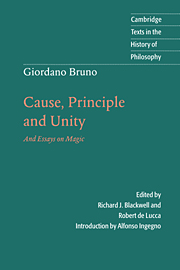Introduction
Published online by Cambridge University Press: 05 June 2012
Summary
Giordano Bruno was born in Nola, near Naples, in 1548. He entered the Dominican Order and, following publication of some works that are now lost, he left Italy in 1579 for Switzerland, France and eventually England, a move perhaps due to the oppressive climate in his own country, where the church felt itself threatened by the new science which he attempted to propagate. Having acquired a great interest in Ramon Lull (c. 1232–1316) and the art of memory, he presented in London his vision of an infinite universe in which he sought to re-unify terrestrial physics with celestial physics on the basis of a principle of universal becoming. He also reflected on the causes of the religious wars and tried to determine the origin of the theological disputes of the period. Beginning with the metaphysics expressed in De la causa, principio e uno (Cause, Principle and Unity), which reflected the objections he encountered in England, he derived a new concept of the divinity which evolved from his cosmology and was to assume a radically anti-Christian character. The magical, animistic vision of everything which he adopted throughout all his writings, not just those of the last period of his life, is evident here. In addition to his specific contributions to the scientific revolution, he presented a general metaphysical vision that contributed significantly to the development of Renaissance philosophy.
- Type
- Chapter
- Information
- Giordano Bruno: Cause, Principle and UnityAnd Essays on Magic, pp. vii - xxixPublisher: Cambridge University PressPrint publication year: 1998



